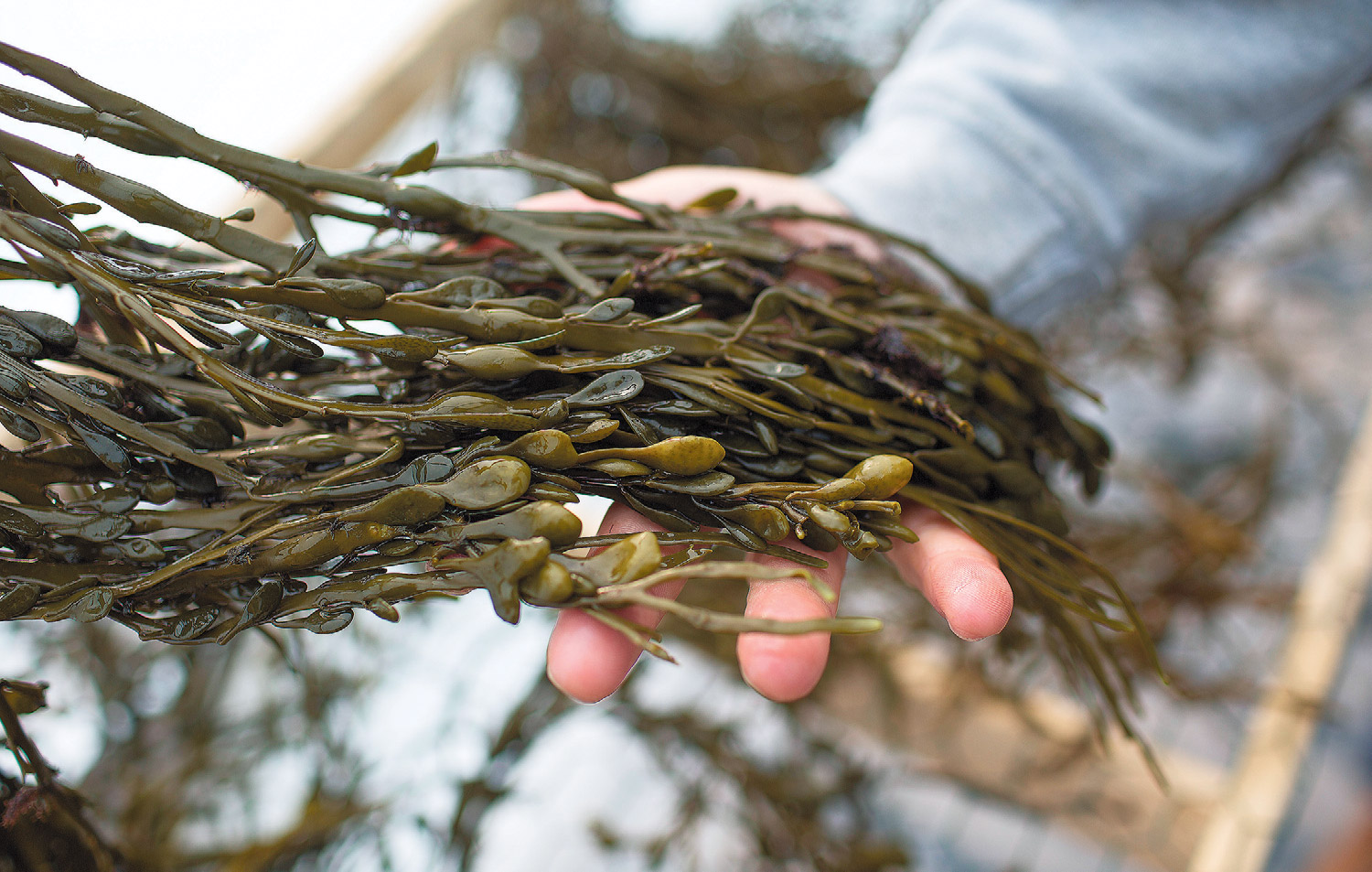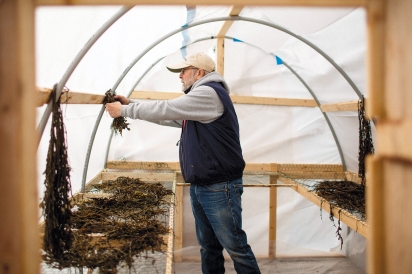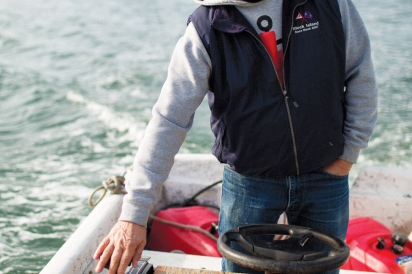Captain David Blaney Turns the Tide Towards Sea Vegetables
A Fresh Idea for the Future of Saltwater Farming
David Blaney of Point Judith Kelp is giving seaweed a makeover. It’s his goal that in a decade or two the slimy stuff found on our beaches will be a staple in a growing number of consumer kitchens and commonplace on restaurant menus. But first, he’s learning how to grow it.
The Blaney family has spent a good deal of time on the water around Point Judith, 300 years to be specific. Growing up on Great Island from a long line of fisherfolk, Blaney knows intuitively how to turn the resources of the sea into business and kelp is the next iteration of this family tradition. After spending a large part of his career as a commercial fisherman, he realized that New England fishermen were “way behind the curve when it came to safety.” So he started what has become a successful marine safety business in the late 1990s: Blaney Marine Safety. It is still in operation.
Blaney’s interest in kelp began several years ago as he observed it growing on and around the fishing boats in Point Judith. He set out to investigate the best local environments for commercial seaweed production. By trial and error he threw an anchor into the water and waited to see what would happen naturally.
Charlie Yarish, professor at the University of Connecticut, is known as the grandfather of the commercial seaweed industry in New England. With decades of research he was willing to share, plus a strong foothold in this emerging industry, Blaney sought Yarish’s advice as he got started. Blaney determined the best spot to cultivate sugar kelp and was given a commercial kelp license by the Rhode Island Coastal Resource Management Council (CRMC) in 2016 (2.75 acres in Point Judith Harbor of Refuge). Getting the approval was a challenge since Blaney was the first to approach CRMC with this type of request. He remained focused and is now paving the way for future kelp farmers in Rhode Island. (A local oyster farm, Walrus & Carpenter, has been experimenting with kelp since 2015 and is running its own commercial kelp farm.)
What’s so great about seaweed anyway? A lot, actually.
Nutritionally, seaweeds are the superfood heroes of the sea. The minerals available naturally in seawater are absorbed and concentrated by kelp, packing the sea vegetable with powerful nutrients that our modern-day diets struggle to include. Sugar kelp, Laminaria saccharina, is a common seaweed variety found on many New England beaches and is the primary crop cultivated today by kelp farmers in New England.
Environmentally, kelp also takes a prize. Similar to shellfish, seaweed removes harmful nitrogen, phosphorus and carbon from the water and does not require watering or fertilizer to grow. Everything needed for kelp cultivation is already available from the sea and the ecosystems where these farms are set will improve over time.
Blaney’s mission is to establish an industry in Rhode Island that helps the coastal fishing communities survive for the next several decades. “There just aren’t enough fish to catch anymore for commercial fishermen,” he says. “We need to be thinking of other solutions now and kelp farming could give a lot of fishermen a viable career option in the off season.”
Sugar kelp seeds are cultivated in a lab on a long line until they reach the size of a pin head—large enough to unravel into the sea. This season 6,000 feet of line were set by Blaney’s Point Judith Kelp company on its farm site. Once the lines are set in November the kelp grows, with regular check-ins from Blaney, until harvest season between March and May. As the lines are pulled up from the water, the large pieces of kelp are cut by hand and taken ashore to be packed and processed. Point Judith Kelp employs two to three parttime workers who work to supplement their clamming operations. Blaney hopes the number will grow. He also acts as a mentor to other fishermen interested in getting into the business.
Bren Smith, another commercial fisherman and mentee of Yarish in Connecticut, went on to create Greenwave in New Haven. In addition to kelp farming startup programs and seed hatcheries (where Blaney gets his seeds, for now), Greenwave also provides processing help for large amounts of seaweed that come from farmers from all over New England. Greenwave has committed to purchasing and distributing the bulk of Point Judith Kelp’s crop this season. They will process the kelp into noodles and sell to large accounts with which they are developing strong relationships, like Google and the New York City public school system.
“These big accounts will help give the industry a foundation,” says Blaney.
On the local level Blaney is selling his sugar kelp both fresh and frozen at the South Kingstown Farmers’ Market. South County chefs are beginning to experiment with his product on their menus and he is currently turning dried seaweed into fertilizer and animal feed supplements for area farms. The latest project from Point Judith Kelp is experimenting with using seaweed oils for a line of beauty products since the same nutrients that are good for us when eaten can do wonders for skin and hair.
“We have a long way to go getting people on board with the all the health benefits and wanting seaweed on their plates—but it’s worth it,” says Blaney. He is thinking in the big picture and the first step is getting more people out on the water growing kelp in Rhode Island. In the future he hopes to establish his own seed hatchery for the rest of the state.
Linda Blaney, David’s sister, is a partner in the business and heads up the marketing efforts in addition to being a trained chef. For the beginner, she recommends using dried seaweed as seasoning in any recipe and experimenting with making a simple broth.
“The flavor is especially good for vegetarians because the kelp offers a real depth of flavor without having to use meat.” As for Linda Blaney’s recipe for South County Seaweed “Chowda,” “The Rockweed will turn bright green in color and will have a little bit of chew,” she explains.
For Point Judith Kelp Co.’s recipe for South County Seaweed “Chowda,” visit EdibleRhody.com.
Look for Point Judith Kelp at South Kingstown Wintertime and Summertime, Goddard Park and Fisherman’s Memorial Park farmers’ markets. For more information, visit them on Facebook and PointJudithKelp.com.







